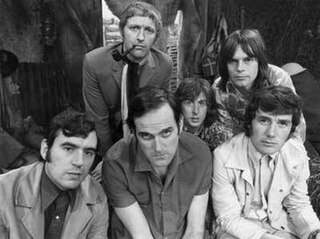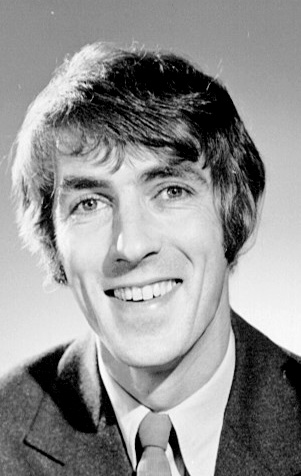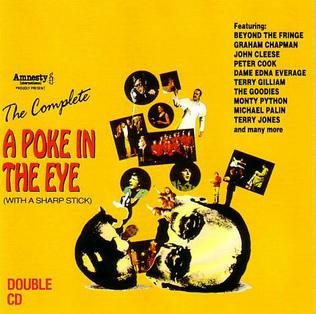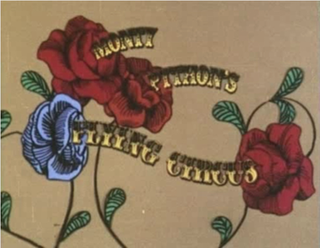Related Research Articles

Graham Chapman was a British actor, comedian and writer. He was one of the six members of the surrealist comedy group Monty Python. He portrayed authority figures such as The Colonel and the lead role in two Python films, Monty Python and the Holy Grail (1975) and Life of Brian (1979).

John Marwood Cleese is an English actor, comedian, screenwriter, producer, and presenter. Emerging from the Cambridge Footlights in the 1960s, he first achieved success at the Edinburgh Festival Fringe and as a scriptwriter and performer on The Frost Report. In the late 1960s, he cofounded Monty Python, the comedy troupe responsible for the sketch show Monty Python's Flying Circus. Along with his Python costars Terry Gilliam, Eric Idle, Terry Jones, Michael Palin, and Graham Chapman, Cleese starred in Monty Python films, which include Monty Python and the Holy Grail (1975), Life of Brian (1979), and The Meaning of Life (1983).

Monty Python were a British comedy troupe formed in 1969 consisting of Graham Chapman, John Cleese, Terry Gilliam, Eric Idle, Terry Jones, and Michael Palin. The group came to prominence for the sketch comedy series Monty Python's Flying Circus, which aired on the BBC from 1969 to 1974. Their work then developed into a larger collection that included live shows, films, albums, books, and musicals; their influence on comedy has been compared to the Beatles' influence on music. Their sketch show has been called "an important moment in the evolution of television comedy".

The "Dead Parrot Sketch", alternatively and originally known as the "Pet Shop Sketch" or "Parrot Sketch", is a sketch from Monty Python's Flying Circus about a non-existent species of parrot, called a "Norwegian Blue". A satire on poor customer service, it was written by John Cleese and Graham Chapman and initially performed in the show's first series, in the eighth episode.

Peter Edward Cook was an English comedian, actor, satirist, playwright and screenwriter. He was the leading figure of the British satire boom of the 1960s, and he was associated with the anti-establishment comedic movement that emerged in the United Kingdom in the late 1950s.
I'm Sorry, I'll Read That Again was a BBC radio comedy programme that was developed from the 1964 Cambridge University Footlights revue, Cambridge Circus., as a scripted sketch show. It had a devoted youth following, with the live tapings enjoying very lively audiences, particularly when familiar themes and characters were repeated; a tradition that continued into the spinoff show I'm Sorry I Haven't a Clue.

Timothy Julian Brooke-Taylor OBE was an English comedian and actor, best known as a member of The Goodies.
"Crunchy Frog" is the common name for a Monty Python sketch officially titled "Trade Description Act", inspired by the Trade Descriptions Act 1968 in British law. It features two health inspectors interrogating the owner of a sweet shop about the increasingly bizarre ingredients in his confections, including the titular crunchy frog. Written by John Cleese and Graham Chapman, it originally appeared in episode 6 of the first series of Monty Python's Flying Circus, and later appeared in several Monty Python stage shows. In the original sketch, Cleese and Chapman play the inspectors, while Terry Jones plays the sweet shop owner. In later versions, the second inspector is played by Terry Gilliam or left out of the sketch entirely.
"One Leg Too Few" is a comedy sketch written by Peter Cook and most famously performed by Cook and Dudley Moore. It is a classic example of comedy arising from an absurd situation which the participants take entirely seriously, and a demonstration of the construction of a sketch in order to draw a laugh from the audience with almost every line. Peter Cook said that this was one of the most perfect sketches he had acted in, and that it amazed him, later in his career, that he could have created it so young, at the age of 17 or 18.
Mr Eric Praline is a fictional character from the television show Monty Python's Flying Circus, played by comedian John Cleese.
Kevin Turvey was a British television comedy character, created by actor and comedian Rik Mayall, who featured in the BBC sketch show A Kick Up the Eighties in 1981.
The Fish Licence is a sketch from Series 2 Episode 10 of the popular British television series, Monty Python's Flying Circus. It first aired on 1 December 1970.

The Rise and Rise of Michael Rimmer is a 1970 British satirical film directed by Kevin Billington, and starring Peter Cook, Vanessa Howard and John Cleese. It was co-written by Cook, Cleese, Graham Chapman and Billington. The film was devised and produced by David Frost under the pseudonym "David Paradine".

A Poke in the Eye (With a Sharp Stick) is the title of the first show in what later became the Secret Policeman's Ball series of benefit shows for human rights organization Amnesty International, although it pre-dated by three years the first show to bear that name. The film of the show was titled Pleasure at Her Majesty's which is sometimes mistakenly thought to be the title of the actual benefit show.
The "Architects Sketch" is a Monty Python sketch, first seen in episode 17 of Monty Python's Flying Circus, "The Buzz Aldrin Show". The episode was recorded on 18 September 1970 and originally broadcast on 20 October 1970. The following year, an audio version was recorded for Another Monty Python Record.
Roger Wilmut is a British writer and compiler of books on British comedy. Wilmut attended Warwick School, and began his 'day job' as studio technician for the BBC on leaving school in 1961. Wilmut claims to have drifted into a career as a writer "by accident". Wilmut's books include The Goon Show Companion, Tony Hancock: Artiste, From Fringe to Flying Circus and Didn't You Kill My Mother-in-law.
The Cambridge Footlights Revue is an annual revue by the Footlights Club, a group of comedy writer-performers at the University of Cambridge. Three of the more notable revues are detailed below.

Monty Python's Flying Circus is a British surreal sketch comedy series created by and starring Graham Chapman, John Cleese, Eric Idle, Terry Jones, Michael Palin, and Terry Gilliam, who became known collectively as "Monty Python", or the "Pythons". The first episode was recorded at the BBC on 7 September 1969 and premiered on 5 October on BBC1, with 45 episodes airing over four series from 1969 to 1974, plus two episodes for German TV. A feature film adaptation of several sketches, And Now for Something Completely Different, was released in 1971.
Film Stars is a well-known comedy sketch by Peter Cook and Dudley Moore. It originally featured on their BBC sketch show Not Only... But Also (1965) and was subsequently performed many times on stage by the duo.
References
- ↑ Thompson, Harry (1997). Peter Cook: A Biography. Hodder & Stoughton. ISBN 9781444717839.
- ↑ Wilmut, Roger, From Fringe to Flying Circus: Celebrating a Unique Generation of Comedy, 1960-1980 (London: Eyre Methuen, 1980), p. 103.
- ↑ Benett, Alan; Cook, Peter; Miller, Jonathan; Moore, Dudley (1987). The Complete Beyond The Fringe. London: Metheun London Ltd. p. 97. ISBN 0-7493-1687-X.
- ↑ Cook, P., & Cleese, J., "Secret Policeman's Ball" (excerpt) on YouTube, 1979.
- ↑ Cook, Wendy E. (2006). So Farewell Then: The Untold Life of Peter Cook. HarperCollins. p. 296. ISBN 9780007228935.